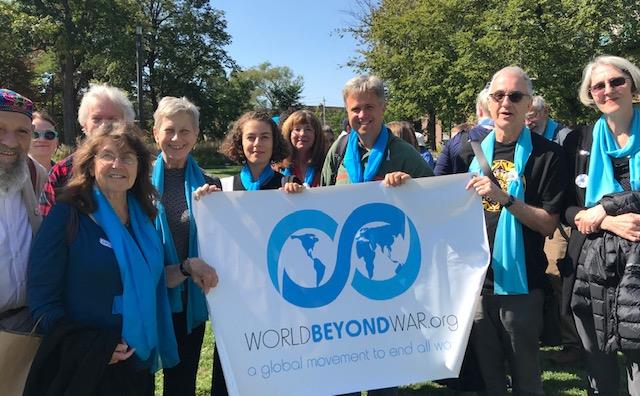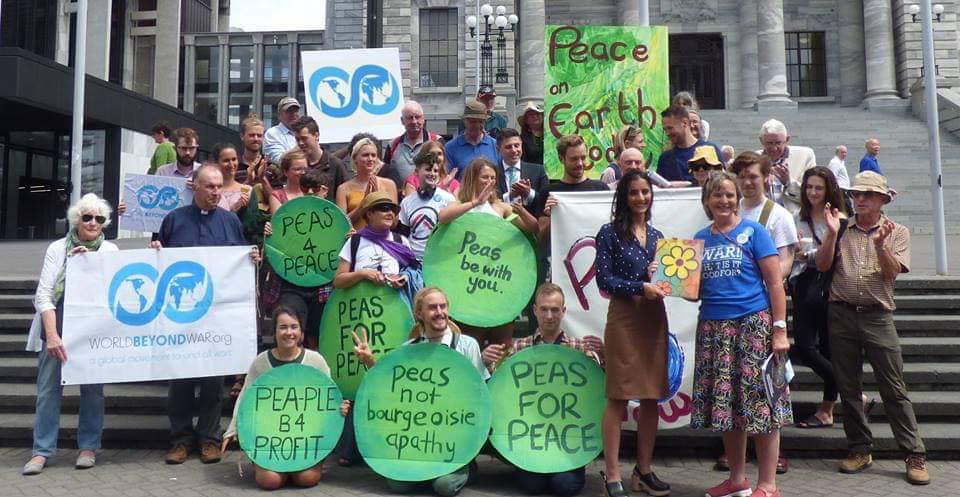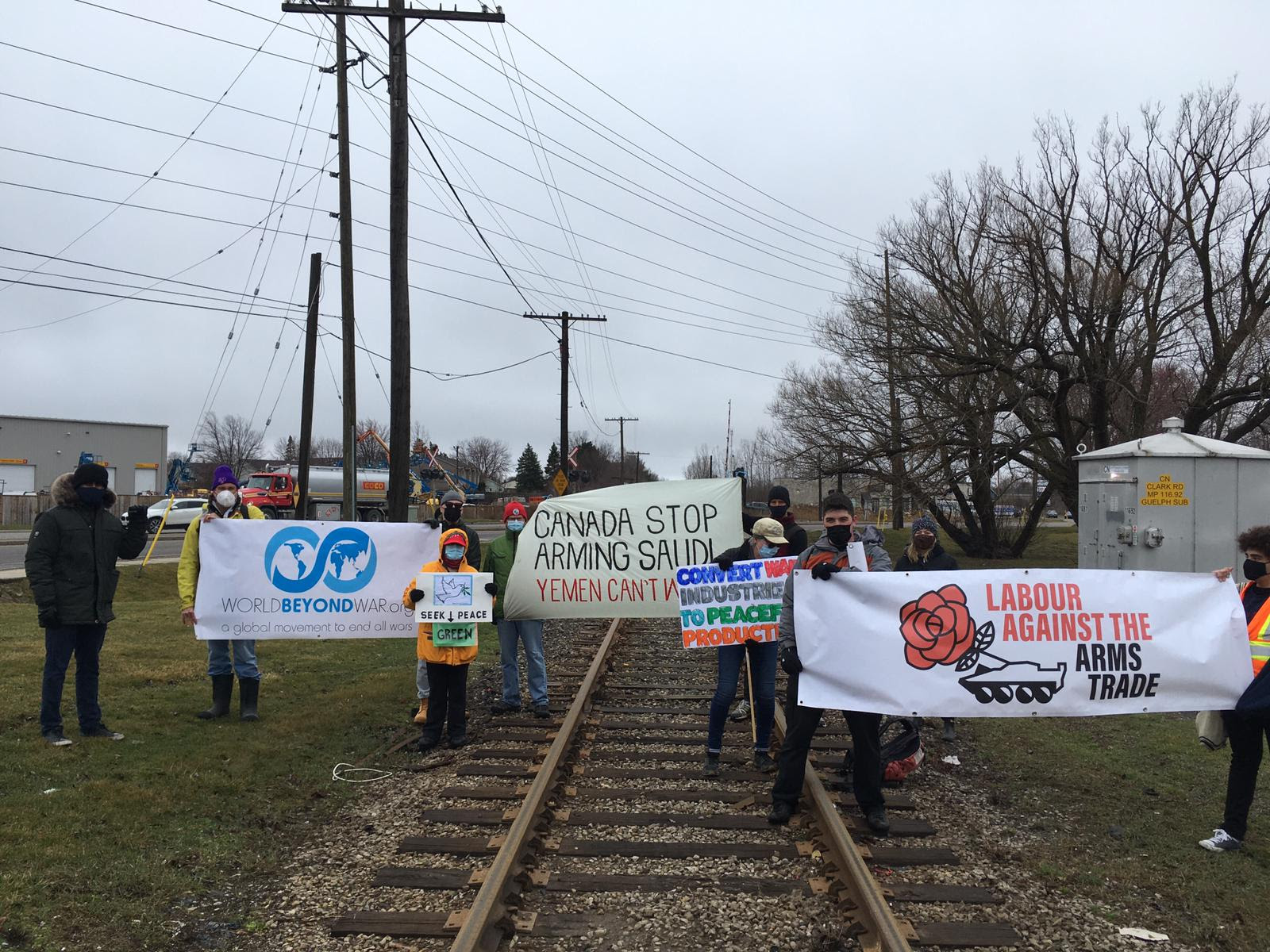
Pro-Peace and Anti-War:
Working Nonviolently to Abolish War Globally
Valeria Mejía-Guevara interviews David Swanson and Alex McAdams of World BEYOND War / ActionNetwork
(September 21, 2022) — World BEYOND War is a global nonviolent movement to end war and establish a just and sustainable peace. Today on International Day of Peace and all year-round, World BEYOND War is working to dispel myths around war — like “War is natural” or “We have always had war” — and to show that war can and should be abolished.
In recognition of the International Day of Peace, we talked with World BEYOND War’s Co-Founder and Executive Director David Swanson and Development Director Alex McAdams about their plans to commemorate the day, their approach to the work of ending war, and how technology has helped them further that goal.
How do you strengthen the idea of peace when facing a world of constant violence?
David Swanson: This notion that there is constant violence has to be questioned. While there is always a war somewhere, there are always 18 million places without a war. Most people live their entire lives without a war.
War is a unique thing. It’s a sporadic thing. It’s a thing that’s consciously chosen. We think war blows across us like the weather. In fact, it takes an enormous, laborious, concerted effort to avoid peace.
You can look back at the extensive efforts that were undergone to avoid peace and the incredible preparations needed for war. You don’t just decide, “I’m going to have a war”. You have to spend incredible efforts building the machinery for war.
“It takes an enormous, laborious, concerted effort to avoid peace.“
Up until the war in Ukraine, which is unique in this regard, in every previous recent year, you could say the places with the wars didn’t manufacture any of the weapons. The weapons are manufactured almost entirely in a small handful of rich Northern places. It’s a malevolent exporting of the instruments of death into the places where they’re used.
Violence can be ended systematically. There are governments that have abolished war and abolished their militaries and put them in museums. There are wars that have been ended and prevented. We are constantly getting treaties put in place, getting weapons shipments stopped, getting base construction prevented, and avoiding wars.

World BEYOND War activists.
There are alternatives to war
There are nonviolent actions that can be taken, even in that moment of highest escalation, never mind avoiding creating the crisis in the first place. There have been coups that have been stopped, occupations that have been ended, tyrants that have been overthrown, and corporate invasions for resources that have been turned away by nonviolent action.
Nonviolent action succeeds better than war at the things war is supposed to do. We have to work nonviolently for more non-violence, and we may fail or we may succeed, but it’s more fun trying than sitting around moaning about it.
Alex McAdams: War is normalized, and, speaking to the United States specifically, [it is evident] how it trickles down into the militarization of police and that in itself is systemic violence.
Who are you targeting with this information? At what point do you turn to those who are responsible for waging war?
David Swanson: Our audience is essentially any living person on earth capable of reading or watching a video or listening to audio. We do very often target particular communities, governments, institutions, and people in power.
We use our Action Network emails, ticketed events, and petitions to do this. We also try to team up with organizations that do not share our point of view, to build alliances between peace actions and environmental actions or civil rights actions or anti-poverty actions or anti-racism actions, or any other action.
In order to target people who disagree, we’re promoting our debate, Can War Ever Be Justified, happening on the International Day of Peace, where I’ll be debating someone who’s arguing that you can have a war that’s justified, that’s moral, that’s necessary.
We try to get people into rooms, virtual or real, who disagree, and then we see if we can move them. We poll people, so we can see what people think at the beginning of the event and what people think at the end. We also use the same tools to target local governments, state governments, provincial, and national governments, for resolutions and changes in policy, often with success and sometimes without success.

The economic engines behind war are a crucial issue. How does your organization approach that?
David Swanson: We try to be both pro-peace and anti-war, because there is a huge constituency out there that adheres to only one of those and despises the other. We like both. We like to talk about what we need to replace war with as well as opposing war.
The U.S. is the leading creator of foreign military bases in other countries. Almost nobody does that on any sort of scale, but the U.S. is all over the globe. It’s the leading participant in wars and coups around the world, but by no means is it the only one.
I think a huge part is the financial issue. There is no question that war is a major business and a dirty business. As Arundhati Roy says, “Once weapons were manufactured to fight wars. Now wars are manufactured to sell weapons.”
Weapons are incredibly profitable. They don’t do any good for most of us. They don’t do any good for the national economy. They don’t do any good for the world economy. They do incredible damage, but for certain people who have already invested millions and millions in the next U.S. election, and effectively own elected officials, they are hugely profitable.
So we do divestment campaigns. We get local governments to take public money out of weapons and in the process, educate everybody and make it more shameful to be profiting from blood.
World BEYOND War’s Mapping Militarism is a database of information about current wars, military spending, military “aid”, and peace treaties around the world. Check out the interactive map here: https://worldbeyondwar.org/militarism-mapped/
How do you create space for the topic of war in the midst of all other conversations?
David Swanson: We try to work with other groups on their priorities, ask them to work with us on our priorities, and show them how they are interlocked. One of the major destroyers of the environment and of the climate crisis is wars and militaries, so we work with all the groups that care about the climate and ask them why they’re okay with excluding one of the biggest destroyers of the climate. Shouldn’t we at least get it included in the conversation and addressed and restrictions put in place, even if it means scaling back the war machine?
How is technology furthering the movement you are building?
Action Network has been essential for the past number of years. It has been our email list, our donor database, our database of who’s interested in what and does what and checked what boxes for what campaigns and chapters and things they want to be a part of and what emails they want to get and don’t want to get.
Within the past couple of weeks, we developed the traffic capacity on our website so that we can embed Action Network features and send people to our website. Action Network has been absolutely essential.
Click here to sign World BEYOND War’s Declaration of Peace.
What do you have planned for the International Day of Peace?
There are events everywhere on this International Day of Peace that people should join — visit our website to learn more. We are doing a debate, which we encourage people to watch, share, and put their questions in the chat for the moderator to ask us.
We created Peace Almanac, which shares important peace events from world history, for 365 days. September 21st is International Day of Peace, but you can join any event year round for peace.
World BEYOND War’s Peace Almanac features important steps, progress, and setbacks in the movement for peace that have taken place on each day of the year. Source: https://worldbeyondwar.org/peacealmanac/
Visit WorldBEYONDWar.org to get involved, sign up to watch the International Day of Peace debate, “Can War Ever Be Justified?”, here, and access the Peace Almanac here.